A couple of years ago I wrote a number of articles under “The Weed of The Week” heading. This column might be headed “The Weed of the Year.” From what I have seen in the fields, and from phone calls and texts I have received, kochia, which I have previously referred to as the scourge […] Read more
Flax

Proposed pulp mill in Sask. would use straw
Producers remind company that straw residue plays an important nutritional role in fields and that supply may be limited
Red Leaf Pulp Ltd. has announced the first of what could be four wheat straw pulp mills in Saskatchewan. Construction of a $350-million facility is expected to begin next year in Regina with operation to begin in the second half of 2023. It will produce about 182,000 tonnes of pulp each year for sale into […] Read more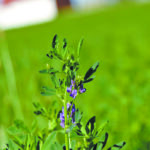
Improved varieties would reduce herbicide waste
Here are some random ideas for cutting waste, cutting costs and thereby reducing greenhouse gas emissions. Alfalfa is a great forage crop, but as a grain producer who collaborates with cattle producing neighbours, I see it as a difficult-to-control weed. While this deep-rooted perennial will sometimes be killed over winter, trying to kill it with […] Read more
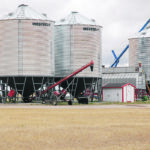
Natural air grain drying simple but complex
Understanding the process can include learning technical terms such as static pressure and equilibrium moisture content
Natural air drying of grain is one of those things that is both complicated and simple. On the simple side, drying grain in a bin is similar to drying laundry on a line. “Going back to old days, we used to hang clothes out on the clothes line. As long as the air is drier […] Read more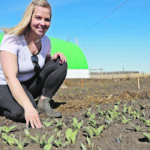
Alberta flower producer thinks like a farmer
On the Farm: Lisa Jans chooses her varieties based on a number of traits, including stem strength and length of stem
NEW NORWAY, Alta. — Lisa Jans is combining her agronomy skills and the global pandemic, which disrupted the flower market, to become a flower farmer. “I love flowers,” said Jans from her central Alberta farm. Each year, her flower beds grew larger, with an equally bigger workload and more weeds to deal with. Then she […] Read more
Special recipes help make Mother’s Day complete
As a child, I loved giving my mom handmade gifts I had made at school and carefully brought home to present on Sunday morning for Mother’s Day. I was lucky enough to grow up with two grandmothers and a great grandmother nearby and I have some precious memories. I once collected what we call “stink […] Read more

Economics of unproductive land reconsidered
Software developed by Agriculture Canada calculates the value of carbon management under various production systems
Shathi Akhter wants to add hard numbers to an issue that has often relied on altruism. “We all know wetlands are good, shelterbelts are good, but how good are they, where’s the dollar value?” Akhter is an agroecosystems scientist with Agriculture Canada at its Indian Head Research Farm near Indian Head, Sask. She specializes in […] Read more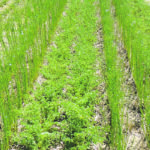
Chickpea and flax intercrop paired-rows
Intercropping done well can give both crops an advantage, provided they have just enough space to do their work
Ascochyta rabiei had resistance to strobilurins, a key management chemistry, at every site in a recent survey of the disease across the prairie chickpea growing region. Michelle Hubbard, a research scientist at Agriculture Canada who led the survey, said the efficacy of fungicides against ascochyta is waning. “There’s issues both with fungicide resistance and with […] Read more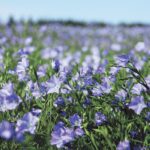
Low ending stocks may offset big seeding plans for flax
Flax markets are at risk of being oversupplied if North American growers follow through with their seeding plans, says an analyst. “It’s a small commodity and big shifts in acres make a big difference,” said Marlene Boersch, managing partner of Mercantile Consulting Venture. The United States Department of Agriculture is forecasting 400,000 acres will be […] Read more

Many crops find a single home under one research roof
For years in Western Canada, commodity groups have mostly stayed in their lane. Provincial canola associations fund research on canola diseases, flea beetles and other issues that affect canola. Flax associations fund research on flax, barley groups fund barley research and so on. The Manitoba Crop Alliance is now taking a different approach. On March […] Read more




